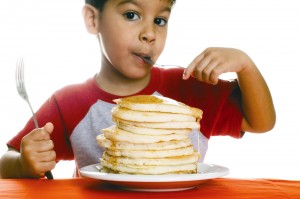Bringing Up Baby
Tom Ashbrook’s show On Point challenges the notion that there are universals in parenting in last Tuesday’s episode, “Bringing Up Baby.” He interviewed Pamela Druckerman, author of Bringing up Bebe: One American Mother Discovers the Wisdom of French Parenting, and developmental psychologist, Jennifer Lansford.
The French focus on a balance between parenting and being adults. According to Druckerman, parents interfere less with their child’s experiences, believing that “kids and adults need space and privacy to cultivate their inner lives.”
Peter Stearns, in the chapter from Anxious Parents entitled “I’m Bored”, explains how much of modern American parenting is a response to children’s boredom and the guilt felt by parents to entertain them.

"It was so easy to think of food as a legitimate reward for being a child when a parent was too busy to offer more elaborate entertainments or felt guilty about not having enough time to spend." (p. 25) (click for source)
Druckerman’s discussion of children’s food made me reflect on my childhood. My poor mom must have had such a hard task pleasing my very picky sister and me. She likes to joke that always if one of us liked a meal, the other wouldn’t. Druckerman says that there are no kids foods in France. Kids inevitably won’t like every food they’re given, so parents just require them to taste the food. The American way, in contrast, is indulgence. Peter Stearns, in his book Anxious Parents, argues, “Tolerance of children’s eating habits… resulted from the real commitment to providing pleasure” (p. 25). In other words, eating is another way to entertain kids.
The perceived frailty of American children is discussed both by Druckerman and Stearn. Druckerman says that French children are more autonomous, and French parents are more comfortable setting boundaries.
Childrearing beliefs are strongly tied to the culture they are found in. I think Stearn’s observation of parents’ obsession with entertaining their children are reflected in our society’s own entertainment consumption habits among adults.


